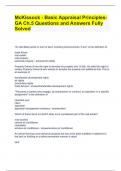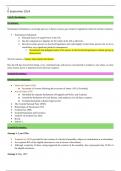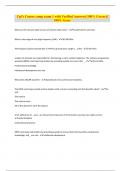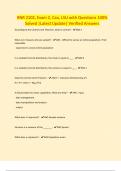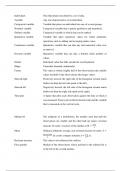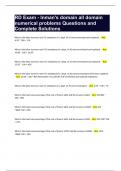Making, 8th Edition Max H. Bazerman Don A. Moore
Discuss the following as used in Managerial Decision Making?
Major Reflective decisions - ANSWER:To buy a house, relationship decisions, Medical
decisions
Lower level decisions - ANSWER:What to wear, shopping... etc.
Rational Decision making process - ANSWER:1. Define problem
2. Identify decision criteria
3. Weigh importance
4. Consider alternatives
5. Rate alternatives
6. Choose optimal decision
Assumptions of Rational Decision Making Process - ANSWER:Rationality,
Problem is clear
All information available
No time/cost limit
Choice will be utility maximizing.
Normative decision theory - ANSWER:how people SHOULD make decisions: choice
that yields largest gain.
Theory does not say that people ARE rational, but they SHOULD be.
Descriptive theory - ANSWER:describes how people actually make decisions
Reference Point - ANSWER:It matters from which point the options are considered.
We think in relative terms and not absolute!
Framing effect - ANSWER:the tendency for people's choices to be affected by how a
choice is presented, or framed.
Saving 200 out of 600 people sounds better than;
Letting 400 out of 600 people die.
Expected utility theory - ANSWER:The idea that people are basically rational, so if
they have all of the relevant information, they will make a decision that results in the
most utility-maximizing decision for themselves.
Dominance Principle - ANSWER:Gambles can be ranked from best to worst in terms
of expected value
Cancellation - ANSWER:If you have a choice between two routes where
,Route A;
1% chance to die
10% chance to go to the hospital
Route B;
20% chance to break a leg
10% chance to go to the hospital
The "10% chance to go to the hospital" probability should cancel out each other, as it
is equally present in both routes, and therefore should not affect the decision made.
Transivitivity - ANSWER:If you prefer A to B and also prefer B to C you will prefer A to
C naturally
Invariance Preference - ANSWER:Assumes there is no framing effect.
Loss aversion - ANSWER:we dislike losses more than we like gains
Example of Loss Aversion in the real world is in football. If a win only gave 2 points, a
draw 1 point and loss 0 points, teams would rather play for the draw instead of
risking the 1 point by playing for the win. Therefore a win gives 3 points and not only
2.
Risk aversion - ANSWER:The tendency to prefer a sure gain of a moderate amount,
even if the riskier outcome might have a higher expected payoff.
-Disliking of uncertainty.
Value function of prospect theory - ANSWER:v(x-r)
X can be seen as a gain/loss relative to Reference point (r)
Will people accept the following bet?
Let's flip a coin -
150 euro for you if head,
100 euro for me if tails - ANSWER:No. Because the pain of a loss is greater than the
pleasure of a gain.
Which is bigger?
The difference in utility gained from winning 3200 vs 4000 euro
The difference in utility lost from losing 3200 vs 4000? - ANSWER:Difference in utility
LOST.
Shown by the graph in Lecture 2, where the blue line (gains) is less steep than the
red line (losses)
Status quo bias - ANSWER:the preference to keep things the way they are rather
than change - even if we didnt choose how things are.
, Mental accounting (key concept) - ANSWER:categorizing spending and saving
decisions into "accounts" mentally designated for specific consumption transactions,
goals, or situations
Hedonic editing - ANSWER:- changing the way you view a gain or loss in order to
maximize your utility
combining losses to minimize amounts of losses for example. Segregating gains to
maximize amount of gains.
As shown on the graph (showing utility from one gain and one loss) getting 5
separate gains, you gain the amount of utility 5 times. But if you clump them
together, the utility gained will diminish gradually.
Other way around in terms of losses.
It is, however, proven that it is very difficult to combine losses to diminish utility loss.
Minimal account,
Topical account,
Comprehensive account - ANSWER:Minimal account: A type of frame that considers
only the difference between two given options, disregarding all their common
features
Buy pen in shop close by: 20 eur
Buy pen in shop 15 min away: 10 eur
Minimal accounting will only see the 10 eur difference
Topical account: Considers the context in which the decision arises. (set a reference
point)
Comprehensive account;
Will take all factors into account - future earnings, actual wealth etc. Using this
account, people should not be influenced by framing.
Choice Bracketing - ANSWER:Choice bracketing refers to the process of mentally
grouping or categorizing multiple options or choices into different sets or brackets.
For example, if you're planning a vacation and considering multiple destinations, you
can use choice bracketing to group destinations based on factors like cost, location,
and activities available. You will then evaluate and make decisions within each
bracket before making a final choice.


